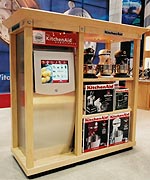Article
KitchenAid mixes it up
When KitchenAid decided to add kiosks to retail stores, it went with an unknown kiosk maker.
March 26, 2002
Lillian Rappette, sales trade marketing manager for KitchenAid, was busy launching the company's first kiosk project. She spoke to KIOSKmarketplace by cell phone while driving home to Indianapolis from meeting with KitchenAid's kiosk designer, Cloonan and Associates, to fine tune the kiosk's content.
"We're launching as we speak," she said, delighted at the prospect of rolling out the kiosks at last for the Whirlpool company.
Virtual shelves
The new machines are an interactive library of KitchenAid's products. A major reason for creating the kiosks was to show dishwashers, refrigerators,
 |
The KitchenAid kiosk sits in a cabinet that recalls a kitchen setting. |
Timothy Cloonan, president of Cloonan and Associates, said that the kiosks allow KitchenAid to put all its products on the sales floor despite a lack of shelf space.
"At this point they are not for purchasing. That is a phase we hope to execute some time next year," Rappette said.
10 machines
Last week the first kiosk went online for the grand opening of the first Great Indoors, in Lombard, Ill. Great Indoors is a new home decorating store owned by Sears Corp. On Thursday the second kiosk went online at another Great Indoors grand opening. By September the appliance maker, perhaps best-known for its retro-styled electric mixer, will place kiosks in ten stores. The company plans to install a few more kiosks at department stores later this year, Rappette said.
Michelle Zendah, marketing coordinator at Cloonan and Associates, said that the Lombard store installation is a test to see how customers receive them.
"This is the initial phase. There's a lot of learning to take away," Rappette said.
Cloonan designed, built, and programmed the kiosks, and shot custom videos for the application, Zendah said.
One video shows a woman at home using a blender to pulverize strawberries and other ingredients into a smoothie. Close-ups showcase the blender, while audio lets shoppers hear it in action, though that may not be the most effective sound for creating sales.
An unknown kiosk maker
Surprisingly, KitchenAid did not seek bids from well-known kiosk companies. Its research consisted of exploring company Web sites and talking to companies at retail shows such as Chicago's Globalshop.
"We did not go through an extensive quoting process of any sort. We were able to really identify what we want to do and bring it in to Cloonan," Rappette said. "We got pretty involved with a number of kiosk industry veterans from the Globalshop show. At that point we hoped to reiterate the fact that the direction we originally planned on going in was the right direction."
 |
Cloonan and Associates used new and some stock art for much of its interface. |
Rappette said that KitchenAid was already aware of Cloonan's reputation for media communications.
"We felt that they could put together a really rich, interactive platform from a content perspective," she said.
Time to delivery was important.
"They had the capability to turn it around in the time frame we needed. We had an introductory pilot in January to get trade interest. From January to now we were able to complete 100 percent of the content needed for launch," Rappette said.
Based in Centerville, Ohio, near Dayton, Cloonan specializes in interactive marketing, sales, training and promotional media.
In January the kiosk debuted at the 2001 International Housewares Show in Chicago and was received well, Rappette said.
This was Cloonan's first release of a kiosk, Zendah said. The media company plans to use its experience to make kiosks for other companies.
Sneaker-net
The kiosks are stand-alone, non-networked machines.
"KitchenAid asked for that. They didn't want to be networked as of now," Zendah said.
Cloonan employees will have their work cut out for them updating the kiosks. The machines will be spread far and wide in Broomfield, Colo.; Springdale, Ohio; Chino Hills, Calif.; Irving, Calif.; Chandler, Ariz.; Novi, Mich.; Columbus, Ohio; Willowbrook, Texas; Town/Country, Texas and Schaumburg, Ill. To change the application, staff will have to manually swap hard drives, Zendah said.
Without networking, the machines can't access a Web site and can't be used to place orders. They do offer reporting, which Rappette considers important for judging their success.
Staying on track
"We can track how much product we see in a particular store. We'll be able to see and compare percentage of sales with kiosks to stores without kiosks," Rappette said.
The tracking software, also designed by Cloonan, will tell KitchenAid whether shoppers are most interested in viewing information on warranties, promotions or products. The company will also learn which products are viewed the most. Rappette explained that the information from the tracking software could be used to guide product promotions and new products by identifying trends in different markets such as the popularity of different colors in different regions.
One challenge in designing the kiosk system was in getting the data down to size. The software, music and voice, screen saver playing KitchenAid national commercials and narrated videos took up too much hard drive space. Eventually, the designers were able to shrink the multimedia from about 4 gigabytes to about 1.2 gigabytes, saving 70 percent of the disk space, Cloonan said.
The agreement between KitchenAid and Cloonan and Associates includes design, development, installation, configuration, testing and servicing. Cloonan didn't reveal how much the agreement was worth.
Rappette, who also wouldn't specify the project's cost, said that in return for KitchenAid's investment, the company hoped for increased sales. Great Indoors was interested enough to devote a large chunk of prime in-store real estate to the kiosk.
"They invested in a good amount of retail space. We are using a 16-foot wall that features not only the kiosk but also the product. It's a fully integrated display, and the kiosk is just a section of this wall," Rappette said.
Forces other than cost, such as the growth of the Internet and the highly competitive nature of retail environments, pushed KitchenAid into the kiosk galaxy.
"We know that kiosks the retail arena are absolutely the future, and we feel that the depth of the brand justifies the expense," Rappette said.







